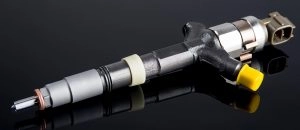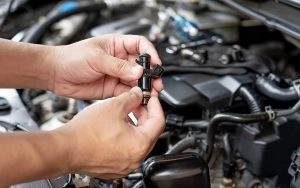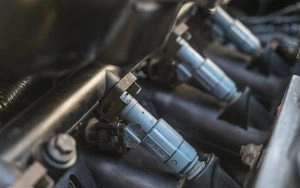Inspecting the car's injectors is one of the most important factors that influence the engine's performance and fuel consumption. To maintain optimal engine performance and fuel efficiency, it is necessary to regularly check the injectors in the car. In this article, we will discuss the most important methods for inspecting the injectors in the car.
What is the importance of car injectors?

Car injectors are a fundamental element in the engine's fuel system, as they precisely control the distribution and spraying of fuel onto the cylinders. This significantly affects the engine's performance and fuel consumption. When car injectors function properly, the fuel completely burns and every drop of fuel is used efficiently.
It is noteworthy that car injectors are significantly affected by deposits and dirt that accumulate on them, leading to their damage and a decline in their performance. Therefore, car injectors should be regularly inspected and cleaned when needed to maintain the health of the fuel system and ensure the continuous efficient operation of the car.
Methods of Checking Car Injectors

Reading fault codes
Reading fault codes is an important method for inspecting the car's injectors. This is done by using a fault code reader that is connected to the OBD-II port in the car. The reading software is installed on the technician's computer or smartphone. The device runs the program to search for the codes stored in the car's internal memory.
A diagnostic device can be used to check for any defects appearing in the injectors, such as decreased engine performance or increased fuel consumption. When any fault code is detected, it is identified, and the description associated with the code is read to determine the cause of the fault. Afterward, the fault is repaired and its specific code is cleared from the memory.
Some examples of common fault codes related to car injectors include the P0171 code, which indicates a leak in the outgoing air, and the P0300 code, which signifies that the injectors are not igniting properly. The technician should consult the car's maintenance manual to learn more about fault codes and how to resolve them.
In the end, reading fault codes is one of the important methods for inspecting the car's injectors and ensuring their safety and the safety of the engine, and it should be done regularly to maintain optimal engine performance.
2- Check the fuel pressure
Checking fuel pressure is one of the important methods for inspecting car injectors. This is done by using a fuel pressure gauge, which is connected to the pressure test valve in the fuel system, and running the engine to determine the level of pressure in the fuel.
When checking the fuel pressure, it should be within the range specified in the car's maintenance manual. If the pressure is less than the allowed limit, this could indicate defects in the fuel system such as a fuel leak, a blockage in the fuel filter, or damage to the fuel pump.
It is worth mentioning that a fuel pressure check should be carried out at the beginning of the inspection process because the correct pressure is essential for good engine performance. There can also be a direct effect on the performance and function of the injectors if the pressure is incorrect.
The specialized technician should regularly check the fuel pressure according to the maintenance schedule recommended by the manufacturer. In this way, the system's safety can be maintained and the engine's performance can be ensured at its best possible level.
Also read:4 Symptoms Indicate a Fault in the Air Sensor
3- Check for fuel leakage
Inspecting for fuel leaks is one of the important methods for checking a car's injectors. This is done by looking for any leaks in the fuel system. This inspection should be conducted regularly according to the maintenance schedule recommended by the manufacturer.
Fuel leakage is examined by checking all pipes, hoses, and other fuel components to ensure there is no damage or cracking that could lead to fuel leakage. It's worth mentioning that any leakage in the fuel system can pose a significant danger, as it could lead to a fire or explosion.
Fuel leakage is also inspected by checking the fuel valves, fuel filter, pumps, and pressure valves in the fuel system. If there are any leaks, the damaged components must be replaced immediately to avoid the problems and damage resulting from them.
It should be noted that a fuel leak check must be carried out at the beginning of the car injector inspection process to ensure there are no leaks in the system before starting to examine the rest of the components. It is also important that the inspection is conducted by a qualified and specialized technician to guarantee the safety of the inspection and to prevent any mistakes.
4- Cleaning the car's injectors

Cleaning and inspecting the car's injectors are important factors that affect the engine performance and fuel consumption. They should be cleaned regularly according to the maintenance schedule recommended by the manufacturer.
Car injectors are cleaned by removing them from the engine and cleaning them thoroughly. Specific cleaners for car injectors can be used, and these cleaners are sprayed onto the injectors and left for a period ranging from 15 to 20 minutes before rinsing with clean water.
The injectors must be carefully dried using dry compressed air and left for a short while to ensure they are completely dry before reassembling them onto the engine. A small brush can also be used to remove dirt and impurities from the car's injectors.
It should be noted that cleaning and maintaining your car is essential for its performance and longevity.Inspecting the car's injectorsIt should be done by a qualified and specialized technician to ensure the safety of the inspection and the absence of any errors in it. It should also be noted that cleaning the injectors alone is not sufficient to maintain the health of the fuel system, and attention should be paid to the periodic inspection and maintenance of the rest of the system components.

Comments